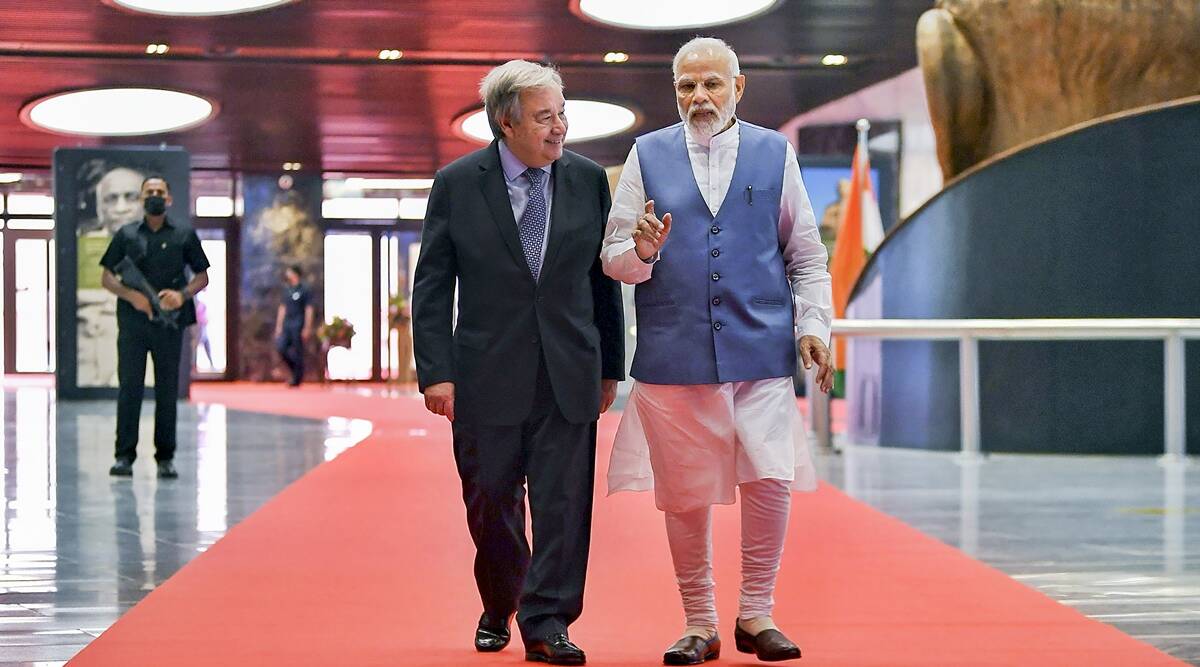 Making planet orientation a top-of-the mind personal value can instantly drive seemingly small but highly impactful behaviour changes.(PTI)
Making planet orientation a top-of-the mind personal value can instantly drive seemingly small but highly impactful behaviour changes.(PTI)Written by Nimish Rustagi
The stage has been set for a grand push to Mission LiFE as Prime Minister Narendra Modi was joined by United Nations Secretary General Antonio Guterres at Gujarat’s Kevadia for a mega event on Thursday. Considering this was the UNSG’s first India visit during his second term, it attests to the mission’s global appeal.
From now on, Mission LiFE will be India’s signature initiative at the UN and other international platforms for showcasing climate action and early achievement of the Sustainable Development Goals.
So, what is Mission LiFE? It all began at COP26 in Glasgow last year when the PM invoked a concept called LiFE, or Lifestyle for Environment. By doing so, he gave expression to a reality that the world has overlooked to its great peril. We cannot continue to live the way we have been living. The “use and dispose” lifestyle has to give way to habits reflecting a mindful orientation towards the planet.
In August, the Union cabinet approved India’s updated Nationally Determined Contribution (NDC), which was communicated to the UN Framework Convention on Climate Change. The first of the eight points listed in the updated NDC emphasises the need “to put forward and further propagate a healthy and sustainable way of living based on traditions and values of conservation and moderation, including through a mass movement for ‘LiFE’ as a key to combating climate change”. During India’s presidency of the G20, sustaining and promoting LiFE will be among key focus areas for deliberations.
How sustainable is Mission LiFE? It envisages a circular economy through people’s participation. It also plans to nurture a global network of individuals, namely “pro-planet people” or P3, who will have a shared commitment to adopt and promote environment-friendly lifestyles.
Niti Aayog and the Ministry of Environment, Forest and Climate Change, in partnership with other institutions, have made a global call seeking ideas — to drive climate-friendly behaviours among individuals, households and communities; for innovative solutions to promote wider adoption of traditional, climate-friendly practices or create livelihood options for communities who may lose their jobs with a shift towards climate-friendly production; and for scalable best practices to bring about climate-friendly behaviour change.
Public, academic and private institutions have been asked to submit idea papers by the end of 2022. The 100 best ideas shall become part of a compendium to be released at the Global LiFE Conference in 2023. And the best ideas shall be awarded at COP28.
Ideas can change the world. However, there is always an implementation challenge to be dealt with. But in this case, failure is not an option and the luxury of procrastination is simply not available. Adapting to a new LiFE would entail massive disruption necessitating the ceasing of old habits and adoption of new ones. It would demand a fundamental change to the way we live, every minute and second. Changing behaviours is challenging, and sustaining change even more so.
A successful shift to LiFE requires focusing on three elements — a stakeholder-based approach, adoption of “planet orientation” as a talisman, and sustained citizens’ buy-in. Adopting a pro-planet lifestyle is no longer the responsibility of the “other”. The buck stops at each one of us — whether institutions, nations, societies or individuals; or whether governments, corporations, entrepreneurs, universities and schools or NGOs.
Dogged engagement has been the vital ingredient for the success of the International Solar Alliance championed by India. Likewise, consider the recent ban on single-use plastic in India. A stakeholder approach, involving collaboration among industry bodies, manufacturers, scientists, schools and educational institutions, civil society groups such as RWAs, media, and local bodies, has a better chance for evolving and diffusing sustainable alternatives to such plastics.
For each stakeholder, “planet orientation” has to become a talisman to judge its thinking, ideas and actions. The DNA of all policies and programmes, decisions, practices, functions, institutional and individual behaviours must be impregnated with a “planet first” approach. Sustainability and preservation of the environment can no longer be the sole responsibility of just one ministry in a government or the sustainability division in a business house. Governments and multilateral institutions have to ensure that regulations, laws and public infrastructure encourages and mandates pro-planet business practices and citizen behaviours.
The world of business needs a green shake up too. Business performance, accounting and audit practices, HR norms and employee appraisals, production and R&D, packaging, marketing and distribution and all other functions must be assessed on the touchstone of planet orientation.
In the final analysis, the success of LiFE would lie in the popular adoption of green behaviours by people, resulting in a Jan Andolan for a planet-friendly lifestyle. This is easier said than done as changing entrenched habits requires much self-control, effort, willpower and mindfulness. Moreover, there shall always be reasons to carry on as usual. For Mission LiFE to succeed, humanity’s buy-in is a must.
Making planet orientation a top-of-the mind personal value can instantly drive seemingly small but highly impactful behaviour changes. It would make us switch off the appliances when not in need, use less water while brushing our teeth, be mindful of plastic consumption, dispose of our e-waste responsibly, walk or cycle to our neighbourhood markets and carry our own jute bag for shopping.
As always, LiFE shall be best when the action begins at home.
The writer, a civil servant, holds a PhD in Consumer Behaviour from HEC Paris, France